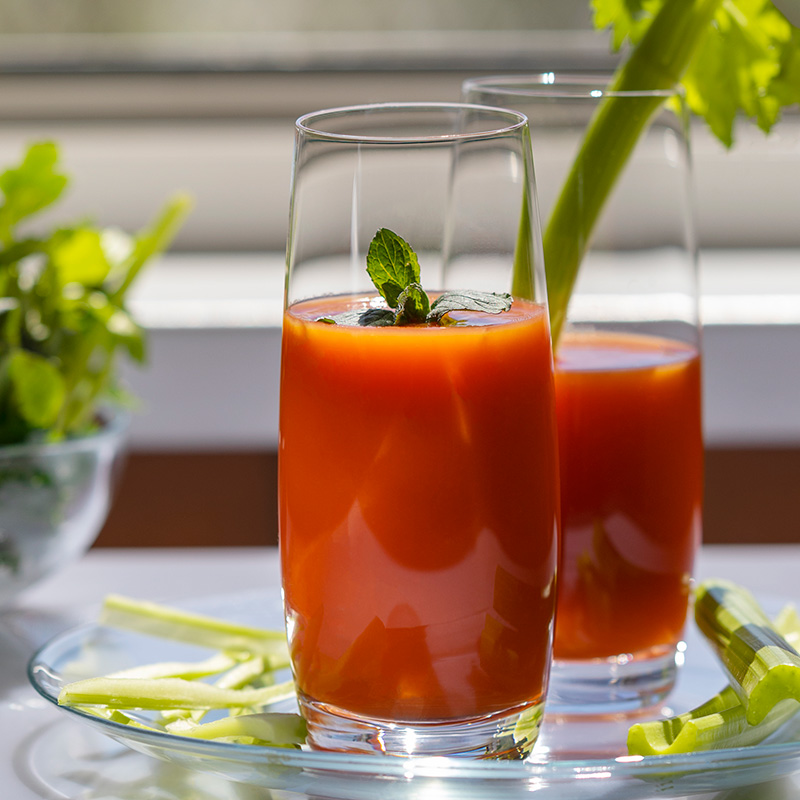Can You Drink Tomato Juice on the Mediterranean Diet
Health & Nutrition Bites
Get the latest health and diet news - along with what you can do about it - sent to your Inbox once a week. Get Dr. Gourmet's Health and Nutrition Bites sent to you via email. Sign up now!
Tomato juice may improve blood pressures

Tomatoes are one of the foods that are better for you, in some ways, when they are cooked: the cooking process actually helps release the antioxidant lycopene that's abundant in tomatoes. Lycopene intake from tomato sources appears to help prevent prostate cancer, for example. Similarly, a diet high in lycopenes that's also high in olive oil has helped improve cholesterol scores in a crossover study.
Researchers in Japan were curious to know if drinking unsalted tomato juice would affect heart disease risk factors like high blood pressure or poor cholesterol scores (Food Sci Nutr 2019;00:1-9). To find out, the authors recruited nearly 500 (481) men and women from their local area, aged 20 to 74 (average age about 57), to participate in their year-long tomato juice study.
At the start and end of the study the participants underwent an annual medical checkup, standard for Japan, that included measuring height, weight, and waist circumference; blood pressures; cholesterol scores including HDL (the good cholesterol), LDL (the bad cholesterol), and triglycerides; and fasting plasma glucose and HbA1c scores.
The authors arranged with the Japanese arm of Del Monte to provide the participants with an unlimited supply of a specific unsalted tomato juice. The juice was supplied in 200ml bottles (about 6.75 ounces), each of which had about 40 calories, 2 grams of fiber, 16 milligrams of sodium, and 22 milligrams of lycopenes as well as other vitamins and minerals. For reference, a medium tomato contains about 3.5 milligrams of lycopenes, while tomato sauce has 20 milligrams in a half cup and tomato soup about 25 milligrams in a cup.
The participants kept records of their tomato juice intake, and at the end of the study the authors note that on average, just over 90% of the participants drank about 1 bottle of the juice per day. (Those who drank less than half a bottle of juice per day were excluded from the study.)
The results are rather interesting. On the one hand, when the authors looked at the averages of each metabolic measure (blood pressures, cholesterol scores, etc.) for the whole of the nearly 500 people and compared those averages from the start and end of the study, there were no statistically significant differences in any of the results.
On the other hand, when the authors looked at only those who were diagnosed as hypertensive or pre-hypertensive (hypertension being high blood pressure), their systolic blood pressures (the top number in a reading) improved an average of about 7 points while their diastolic blood pressures (the bottom number in a reading) improved an average of about 3 points.
Similarly, those who began the study with concerning LDL cholesterol scores improved their score by about 5 points.
One major drawback of this study is that just over half of the study participants responded to lifestyle questionnaires that might have allowed the authors to know if lifestyle changes over the course of the study had an effect on the results. On the plus side, those who did respond to the questionnaire indicated no significant changes to their lifestyle.
What this means for you
Before you start guzzling tomato juice at every meal, bear in mind that the improvements in cholesterol and blood pressure scores were modest and only clinically significant in those who already were having trouble with those scores. If your blood pressures and cholesterol scores are in the normal range, drinking tomato juice is unlikely to do much for you.
Consider also that while the participants kept records of their tomato juice consumption, they did not fill out dietary questionnaires: those who responded to drinking the tomato juice may have been low in dietary antioxidants anyway.
Other, more significant drawbacks: First, there was no control group of those who did not drink tomato juice. Second, removing those who did not drink enough tomato juice (in the authors' opinion) was likely a mistake: this would have given a better cross-sectional view of the possible effects of the tomato juice. Third, and worst: Kikkoman, who provided a grant to the researchers to fund this study, owns Del Monte.
What this does mean is that tomatoes are great for you (and more research into their effects on blood pressures and cholesterol scores is worth doing). It's better to get your antioxidants from food, not supplements, so here are a few tomato recipes to get you started.
Tomato Sauce (from canned tomatoes)
Tomato Sauce (from fresh tomatoes)
Low Acid Tomato Sauce (GERD-friendly)
Quick and Easy Tomato Sauce and Pasta
Chilled Roasted Tomato Soup
Roasted Tomato Soup with Garlic and Corn
Tomato Basil Soup
First posted: May 13, 2020
Can You Drink Tomato Juice on the Mediterranean Diet
Source: https://www.drgourmet.com/bites/2020/051320.shtml